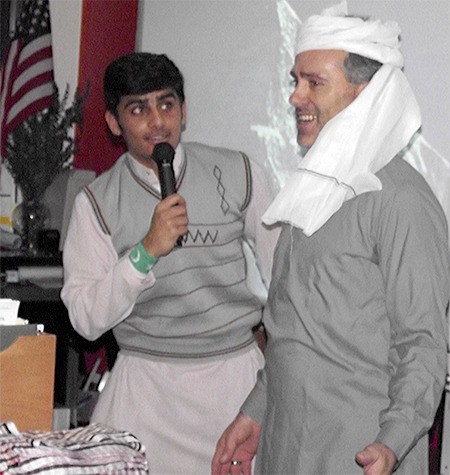MARYSVILLE – All Muslims are not terrorists.
But ever since Sept. 11, 2001, some Americans think they are.
So, Youth Exchange KLES has been involved with the American Consulate in sending Muslims to the states since then to exchange cultures.
“You know us, we know you,” Fatima Saeed of Pakistan said.
Just recently, a school in Pakistan was victimized by terrorists as dozens of schoolchildren were slain.
Fatima and Rashid Rehman, a junior at Marysville Getchell High School, condemned those actions, and said their country is fighting to reduce those acts of terrorism. Rashid said it was an act of revenge at a military school. The terrorists asked all of those with fathers in the Army to stand up. When they did, they were shot.
“This is a huge loss of Pakistan because those students were a great part of our future. May their souls rest in peace,” Rashid said.
Fatima and Rashid have been in the local area since August. As part of their foreign exchange program they are supposed to inform others about their country. But they are both running into some roadblocks at school. Their presentations are limited to their own classes because schoolwide assemblies are booked for 2014-15.
So, they would like to be able to speak to community organizations, such as churches, civic groups, chambers, etc. While the presentations they give at school are more general information, they both said they can tailor their Power Points to the desires of the audience.
Rashid said while everyone in Pakistan knows where the United States is by age 5, many in high school don’t have any idea where Pakistan is. He said he gets asked weird questions, too, like, “Do you ride camels to school?”
Rashid said many things in the United States are different, some better, some worse.
“People are more frank,” he said. “They smile every time.”
Fatima concurred.
Back home “if a stranger smiled at you – there’s something wrong with that guy – they’d stare back like they’d want to eat him,” Fatima said.
She added that’s exactly the opposite of what they are supposed to do.
“The prophet says we’re supposed to smile at every person we see,” Fatima said.
Fatima lives in north Pakistan, where there are houses ranging from mud to castles. Rashid lives in the south in a village. His dad is a laborer.
They both agreed school is easier in the states. In Pakistan they go to school six days a week from kindergarten through their sophomore years. Then they have to pass national exams to go to college and then a university.
“It’s easier here, too easy,” Fatima said, adding she’s taking Advanced Placement calculus, which she took last year in Pakistan.
They agreed student behavior also is different here.
“They’re on their cell phones, and they can eat and drink anything they want,” Rashid said. “We can’t do that. It distracts students from concentrating.”
Fatima said school security is tighter in Pakistan due to the threat of terrorism.
Rashid said women who work in south Pakistan are mostly teachers, but Fatima said she wants to be an environmental engineer. She said her mother is a college graduate, and her dad has worked in safety in the oil fields for 30 years. Her passion is physics and math, and she has two younger brothers.
“I need to show them the path they need to go,” she said.
Rashid has four brothers and two sisters. Two of his older brothers are in the military. He had thought about joining them, but they advised him to become a scholar.
“They guide me, I guide them” (his younger siblings), he said.
Rashid said he enjoys his American folks, Lloyd and Jacqueline Trout, but Fatima had a rough start with her first American home. She was placed in another one that she just loves.
“They’re awesome,” she said. “Their get togethers are so Pakistani” with the cooking, sports, politics…
Sports are not as big in Pakistan as they are here, Rashid said, adding cricket and hockey are the most popular ones.
Fatima, a junior at Cascade in Everett, said there are some students who are just into sports, parties and video games like in America, but there are many more who focus on academics and helping others. Rashid and some of his friends actually have started an organization that helps others in society.
Fatima wears a covering over her head called a hijab. She said doing that has become a personal choice in Pakistan.
“Religion defines your culture,” Fatima said of the Islam tradition. “It means that you respect yourself and others in front of you. Modern people forget religion.”



